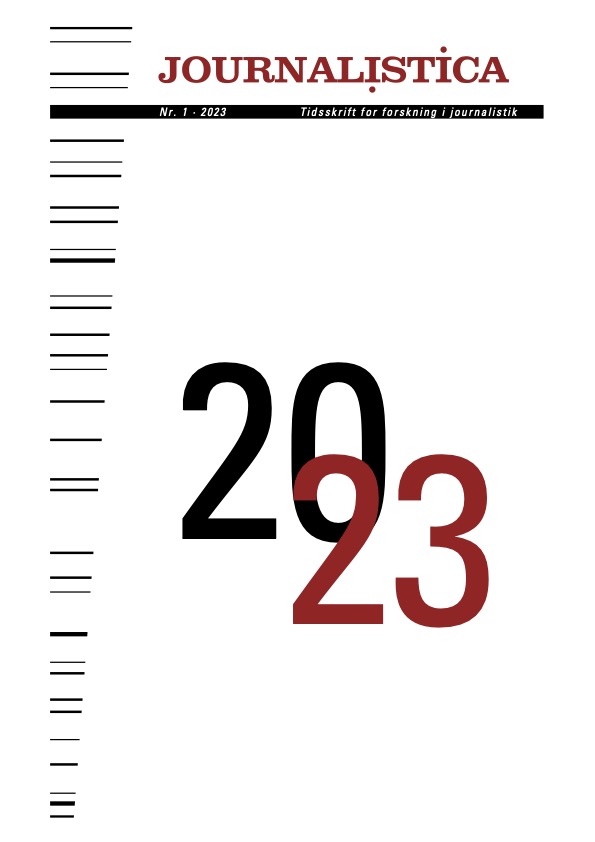Discourse analysis in journalism studies
DOI:
https://doi.org/10.7146/journalistica.v17i1.138573Nøgleord:
discourse analysis, journalistic boundaries, journalistic roles, power relations, metajournalistic discourse, discourse theory, critical discourse analysisResumé
In this section, Journalistica puts a spotlight on research methods used in journalism studies and/or journalism practice.
Listen to the Journalistica podcast episode about this article on Spotify.
Referencer
Baker, P., Gabrielatos, C., Khosravinik, M., Krzyzanowski, M., McEnery, T., & Wodak, R. (2008). A useful methodological synergy? Combining critical discourse analysis and corpus linguistics to examine discourses of refugees and asylum seekers in the UK press. Discourse and Society, 19(3), 273–306. https://doi.org/10.1177/0957926508088962
Carlson, M. (2016). Metajournalistic Discourse and the Meanings of Journalism: Definitional Control, Boundary Work, and Legitimation. Communication Theory, 26(4), 349–368. https://doi.org/10.1111/comt.12088
Carlson, M. (2018). The Information Politics of Journalism in a Post- Truth Age. Journalism Studies, 19(13). https://doi.org/10.1080/1461670X.2018.1494513
Dahlberg, L., & Phelan, S. (2011). Discourse Theory and Critical Media Politics. Palgrave Macmillan. https://doi.org/10.1057/9780230343511
Dindler, C., & Blaagaard, B. B. (2021). The colour-line of journalism: Exploring racism as a boundary object in journalistic practice and principles. Journalistica, 1, 90–113. https://doi.org/10.7146/journalistica.v15i1.124927
Fairclough, N. (1995). Media discourse. Bloomsbury.
Fairclough, N. (2003). Analysing Discourse: Textual analysis for social research. Routledge. https://doi.org/10.4324/9780203697078
Fairclough, N. (2013). Critical Discourse Analysis: The Critical Study of Language (2nd edition). Routledge. https://doi.org/10.4324/9781315834368
Fairclough, N., Mulderrig, J., & Wodak, R. (2011). Critical Discourse Analysis. In T. A. van Dicjk (Ed.), Discourse Studies (2nd edition, pp. 357–378). https://doi.org/10.4135/9781446289068.n17
Farkas, J. (2023a). Fake News in Metajournalistic Discourse. Journalism Studies. Advance online publication. https://doi.org/10.1080/1461670X.2023.2167106
Farkas, J. (2023b). News on Fake News: Logics of Media Discourses on Disinformation. Journal of Language and Politics. 22(1), 1–21. https://doi.org/10.1075/jlp.22020.far
Hanitzsch, T., & Vos, T. P. (2017). Journalistic Roles and the Struggle Over Institutional Identity: The Discursive Constitution of Journalism. Communication Theory, 27(2), 115–135. https://doi.org/10.1111/comt.12112
Hansen, A. D., & Sørensen, E. (2005). Polity as Politics: Studying the Shaping and Effects of Discursive Politics. In D. Howarth & J. Torfing (Eds.), Discourse Theory in Eorupean Politics: Identity, Policy and Governance. Palgrave Macmillan. https://doi.org/10.1057/9780230523364_4
Jorgensen, M., & Phillips, L. J. (2002). Discourse Analysis as Theory and Method. SAGE Publications. https://doi.org/10.4135/9781849208871
Laclau, E. (2014). The Rhetorical Foundations of Society. Verso Books.
Laclau, E., & Mouffe, C. (2014). Hegemony and Socialist Strategy: Towards a Radical Democratic Politics. Verso.
Marttila, T. (2016). Post-Foundational Discourse Analysis: From Political Difference to Empirical Research. Palgrave Macmillan. https://doi.org/10.1057/9781137538406
Moran, R. E., & Shaikh, S. J. (2022). Robots in the News and Newsrooms: Unpacking Meta-Journalistic Discourse on the Use of Artificial Intelligence in Journalism. Digital Journalism. https://doi.org/10.1080/21670811.2022.2085129
Nohrstedt, S. A., Kaitatzi-Whitlock, S., Ottesen, R., & Riegert, K. (2000). From the Persian Gulf to Kosovo - War Journalism and Propaganda. Journal of Communication, 15(3). https://doi.org/10.1177/0267323100015003007
Richardson, J. E. (2008). Language and journalism: An expanding research agenda. Journalism Studies, 9(2), 152–160. https://doi.org/10.1080/14616700701848139
Richardson, J. E. (2010). Journalism and Language. Routledge.
Riggs, K. E., Eastman, S. T., & Golobic, T. S. (1993). Manufactured conflict in the 1992 Olympics: The discourse of television and politics. Critical Studies in Mass Communication, 10(3), 253–272. https://doi.org/10.1080/15295039309366867
Teo, P. (2000). Racism in the news: a Critical Discourse Analysis of news reporting in two Australian newspapers. Discourse & Society, 1(1), 7–19. https://doi.org/10.1177/0957926500011001002
Torfing, J. (2005). Discourse Theory: Achievements, Arguments, and Challenges. In D. Howarth & J. Torfing (Eds.), Discourse Theory in European Politics: Identity, Policy and Governance (pp. 1–32). Palgrave Macmillan.
Unger, J., Wodak, R., & KhosraviNik, M. (2016). Critical Discourse Studies and Social Media Data. In D. Silverman (Ed.), Qualitative Research (4th edition, pp. 277–293). SAGE Publications.
Vos, T. P., & Thomas, R. J. (2019). The Discursive (Re)construction of Journalism’s Gatekeeping Role. Journalism Practice, 13(4), 396–412. https://doi.org/10.1080/17512786.2018.1478746
Wodak, R. (2014). The Politics of Fear: What Right-Wing Populist Discourses Mean. SAGE Publications.
Wodak, R., & Meyer, M. (2016). Methods of Critical Discourse Studies. SAGE Publications.
Zappettini, F., & Krzyżanowski, M. (2019). The critical juncture of Brexit in media & political discourses: from national-populist imaginary to cross-national social and political crisis. Critical Discourse Studies 16(4), 381–388. https://doi.org/10.1080/17405904.2019.1592767
Downloads
Publiceret
Citation/Eksport
Nummer
Sektion
Licens
Copyright (c) 2023 Johan Farkas

Dette værk er under følgende licens Creative Commons Navngivelse (by).
Forfattere, der publicerer deres værker via dette tidsskrift, accepterer følgende vilkår:
- Forfattere bevarer deres ophavsret og giver tidsskriftet ret til første publicering, samtidigt med at værket er omfattet af en Creative Commons Attribution-licens, der giver andre ret til at dele værket med en anerkendelse af værkets forfatter og første publicering i nærværende tidsskrift.
- Forfattere kan indgå flere separate kontraktlige aftaler om ikke-eksklusiv distribution af tidsskriftets publicerede version af værket (f.eks. sende det til et institutionslager eller udgive det i en bog), med en anerkendelse af værkets første publicering i nærværende tidsskrift.
- Forfattere har ret til og opfordres til at publicere deres værker online (f.eks. i institutionslagre eller på deres websted) forud for og under manuskriptprocessen, da dette kan føre til produktive udvekslinger, samt tidligere og større citater fra publicerede værker (se The Effect of Open Access).




